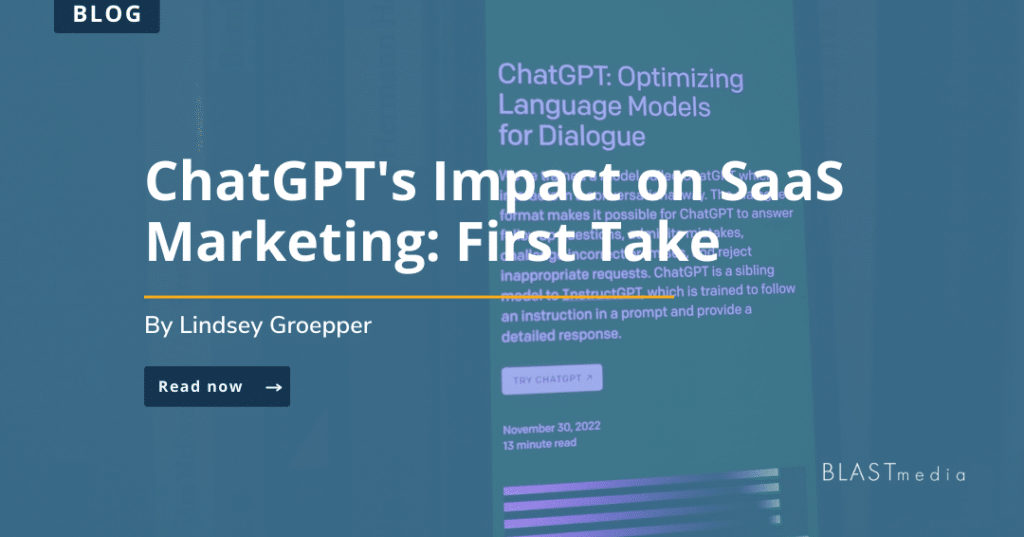
Like many, I’ve spent the last few months reading, watching and listening to various opinions regarding generative AI and ChatGPT, a large language model trained by OpenAI. This technology takes immense amounts of data, looks for patterns, and becomes more proficient at mainly generating accurate and probable outputs. The buzz surrounding the tech today is primarily around the humanlike language and thoughts it can generate with only a few inputs from you or me.
More specifically, I’ve naturally leaned into how AI bots like ChatGPT affect the marketing industry and our future as a SaaS PR agency. Through this journey, I’ve realized that many of us are asking the wrong question. It’s not about whether or not ChatGPT will replace marketing jobs. The reality I’ve come to accept, and excitedly so, is that marketers who embrace ChatGPT will replace those who do not. And I believe this holds for every company across every sector.
The businesses that are quickest to adopt and refine this technology will win.
If you’re still on the fence about generative AI, I get it. It’s a lot to digest. To help potentially reframe your thinking, I’ll tackle a few overarching takeaways from the hours of material I reviewed, including insight from academics, technologists, marketers and analysts.
The technology reflects us
There will be ChatGPT champs and chumps, as ChatGPT starts with a human entering a prompt for a specific outcome. Suppose a particular human is apathetic about their job, takes shortcuts, and is generally lazy before using ChatGPT. In that case, there is a good chance ChatGPT will be used in a way that reflects poorly on the technology and its output. The output quality will depend on how much attention and time is spent on the input and refining the results. The lazy human will take the first draft received from the bot and run with it as the final.
On the flip side, if one approaches the technology from the viewpoint of being a beginning point, an idea-starter, and a tool to be more efficient, the strength, value and perception of the technology will be positive. The intuitive and intentional use of ChatGPT can result in helpful and valuable outputs if you approach it the right way.
Bots can’t be “forwardists”
AI bots like ChatGPT are limited to replicating what they’ve learned from what already exists online. And the training set currently only includes data through 2021. For example, ChatGPT won’t be able to create language around a new SaaS category, introduce a future concept or promote a new product because there is likely nothing accurate online about it yet from which to pull data.
Creating new points of view and introducing fresh concepts or unique predictions will still require human insight and creativity.
If you’ve played around with ChatGPT, as I have, you’ll see both the impressive value and the limitations of the technology. For example, I noticed very confident falsities in the output, “facts” that were inaccurate or not cited. In addition, most results were fairly general and baseline, even with intentional and detailed inputs.
ChatGPT isn’t good enough (yet) to be a competitor
The technology isn’t good enough yet to be seen as a competitive threat or a viable replacement for human creativity and common sense. Rather, it’s just another new tool in the martech stack. It’s insanely helpful at cranking out a “crappy first draft” when staring at a blank page, writing alternative headlines or email subject lines, and revising content in another tone or voice.
Think of ChatGPT as adding a new instrument to the band. It enhances the overall sound but doesn’t replace or compete with the other instruments.
Bot bias is real
One of the key challenges with AI-generated content is the risk of bias, which shows up for a couple of reasons. First, the AI has trained on a biased sample set because the internet inherently is limited with a general lack of representation in its content. Second, humans are biased, so human-created content is biased too.
Marketers need to be trained and more attentive to bias and take steps to minimize it in their communication. It is not a simple tech fix, but it requires a conscious effort on the part of marketers to ensure their communication is unbiased and inclusive.
Modern marketing teams will adapt ChatGPT; it’s inevitable if you want to survive. But it’s up to us humans to use it effectively and creatively. As with any tool, it’s only as helpful as the person wielding it. So, let’s become highly skilled at our technique and use it when needed and for the proper purpose.
